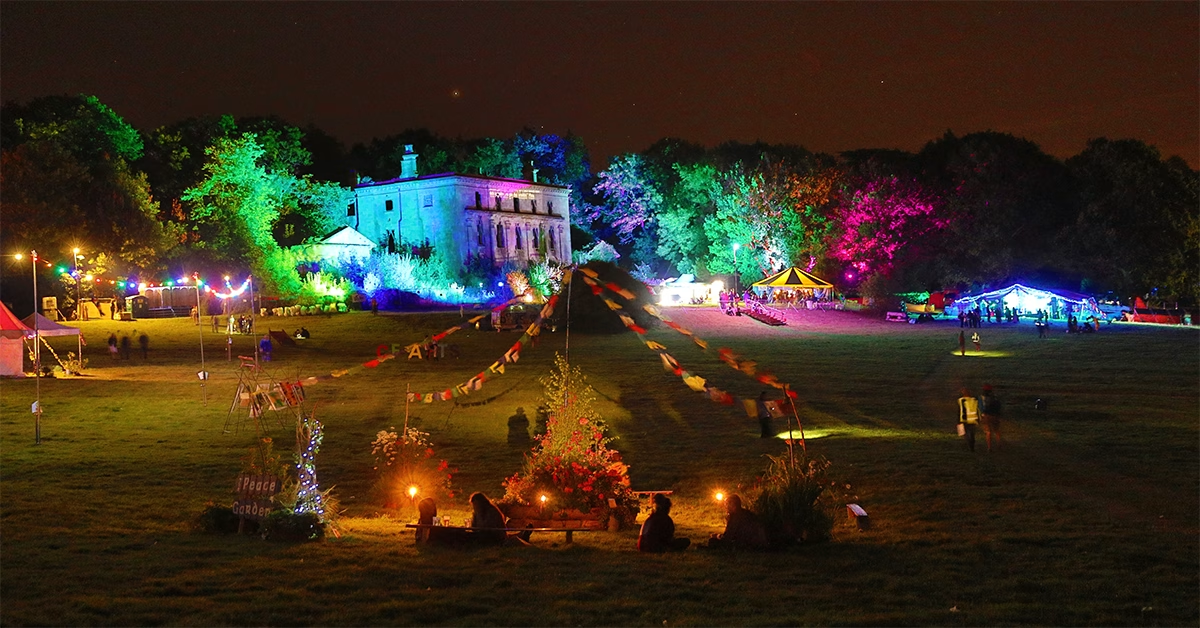A four-day, low impact festival based in the Welsh Borders, The Green Gathering is the original off-grid festival. Existing in various incarnations since the early 1980s, it brings together a community of 5000 people every year for a weekend entirely powered by wind, sun and people.
Sustainability is written into the DNA of this community and event; for over a decade The Green Gathering has been showcasing green technologies, providing a networking hub for environmental activists, giving families their first taste of a greener lifestyle and demonstrating that festivals can be peaceful, sustainable and educational.
As electrical needs on site are met entirely by renewable energy, travel ends up accounting for 98% of the festival’s entire emissions, and remains the festival’s final challenge to reducing its impact.
As a response, The Green Traveller Guide was launched. The Green Gathering believes the final hurdle will be leaped through collaboration – organisers need to put in place initiatives, which inform individuals and empower them to make the best travel choices. All ticket buyers are emailed this guide before attending.
The guide does three things to help festival-goers change the ways they travel:
- Informs about emissions generated through different methods of transport
- Instructs how to get to the festival by public transport, dedicated coaches or carsharing, and includes tips for how to pack light to make this easier
- Incentivises festival-goers who choose to come by foot, bike or public transport; rewards include a free express shuttle bus from train station to site, free programmes and free equipment as part of Camplight tent hire packages.
- Links to Tuned in Travel’s offer of festival coaches from key cities (and emissions from these coaches will be balanced through onboard.earth too).
Alongside this guide, The Green Gathering has schemes to help reduce travel emissions by crew, artists and other contributors: only essential vehicles are allowed on site and their movements are limited; there is a limit to the number of free crew and artist vehicle passes available; a no idling policy is in place; and medical teams use bikes for non-emergency callouts.
Finally, for those who have no choice but to drive, The Green Gathering teams up with onboard.earth to offer the chance to balance travel emissions through donations, 100% of which are invested in projects that generate clean renewable energy.
So far success has been seen through a reduction in car passes and the Crew/Artist vehicle ratio dropping from above 50% to below. Over 100 ticket-buyers have already balanced their travel emissions with onboard.earth for 2022.
Having offered guided cycle rides for several years with little take-up, the festival has shelved this option for now – not because no one cycles to The Green Gathering but because those who do are proficient cyclists who like to come in their own time and don’t need guiding, whereas for the less experienced cyclist it’s just too big an ask and no amount of buzz, rewards or cool guides will persuade them. Changing this is a task above and beyond what one festival can achieve – we need to keep encouraging cycling at a national level, putting in place more bike lanes and free cycle training, to overcome understandable fear and reticence.
It will be interesting to see whether the revamped Highway Code, which aims to make cycling safer, and the recent hike in fuel prices, will combine with a desire to take action on the climate emergency to get more festival-goers onto two wheels. Arriving by unicycle or tricycle will also earn Green Gathering rewards!
Find out more about The Green Gathering’s green ethos here.
Photo credit: Stefan Handy for The Green Gathering

